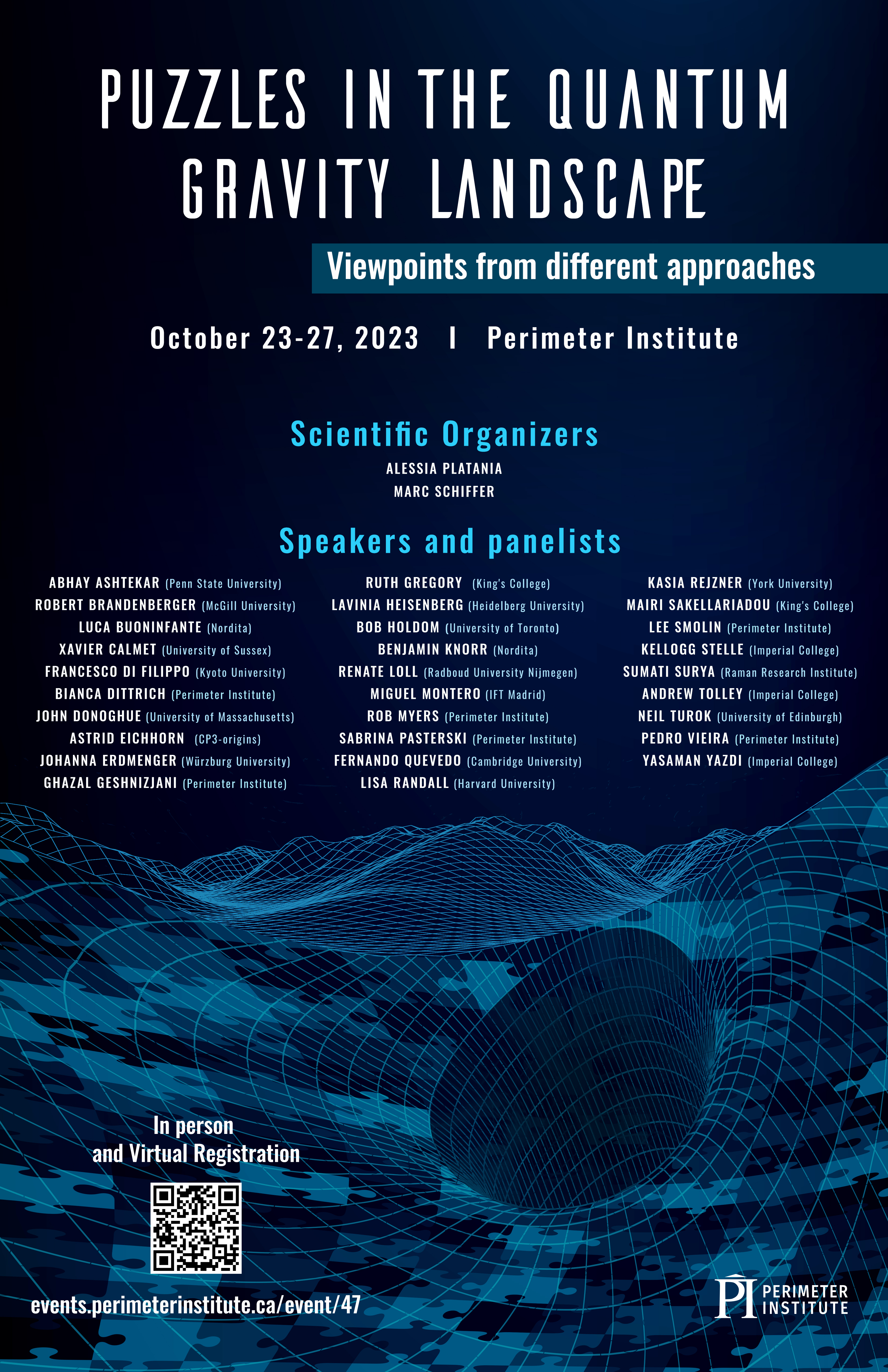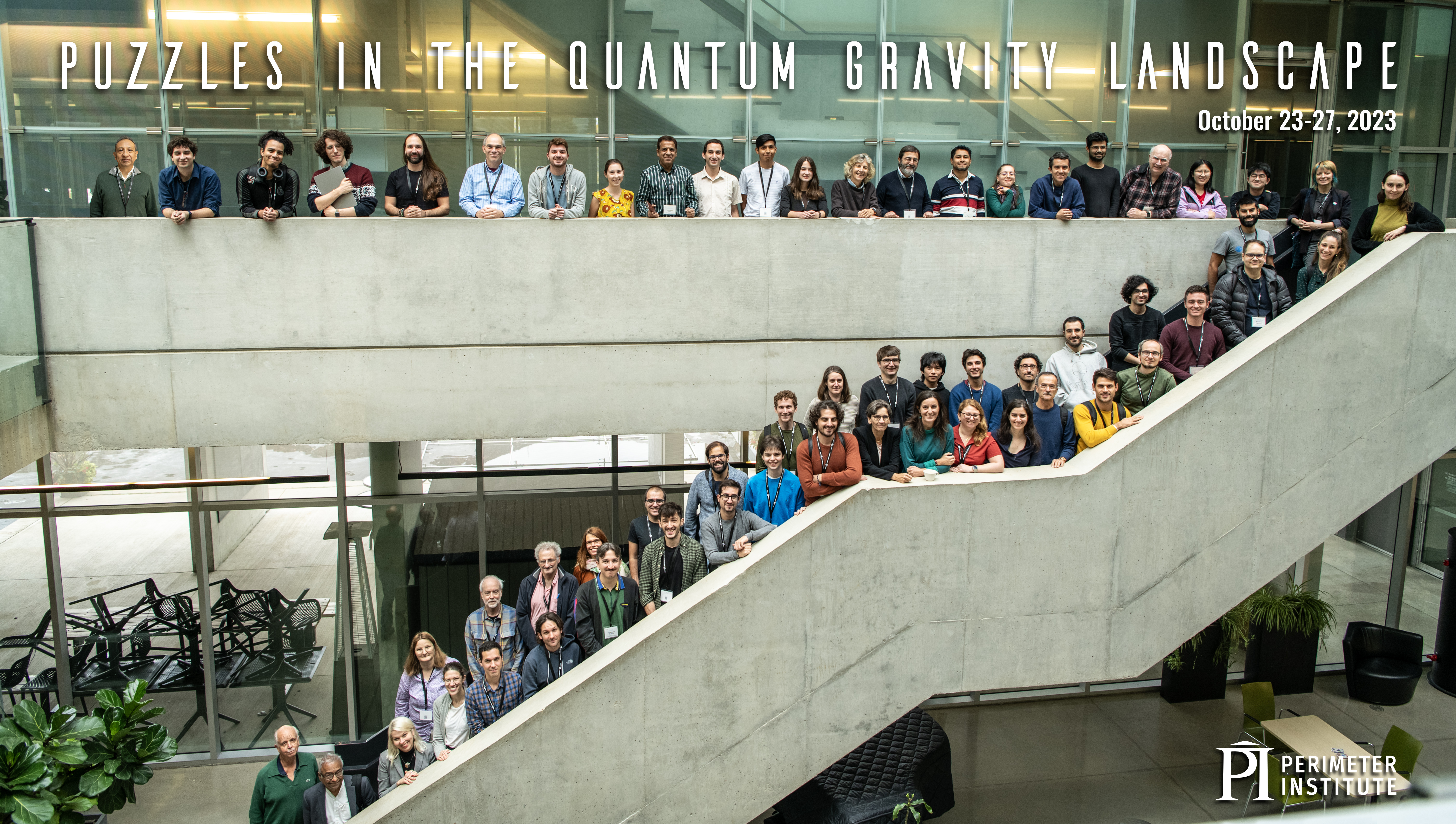Format results
-
Talk
-
-
Talk
-
-
Talk
-
Quantum Foundations Lecture
Lucien Hardy Perimeter Institute for Theoretical Physics
-
Quantum Foundations Lecture
Lucien Hardy Perimeter Institute for Theoretical Physics
-
Quantum Foundations Lecture
Lucien Hardy Perimeter Institute for Theoretical Physics
-
Quantum Foundations Lecture
Lucien Hardy Perimeter Institute for Theoretical Physics
-
Quantum Foundations Lecture
Lucien Hardy Perimeter Institute for Theoretical Physics
-
Quantum Foundations Lecture
Lucien Hardy Perimeter Institute for Theoretical Physics
-
Quantum Foundations Lecture
Lucien Hardy Perimeter Institute for Theoretical Physics
-
Quantum Foundations Lecture
Lucien Hardy Perimeter Institute for Theoretical Physics
-
-
Talk
-
-
Talk
-
-
Talk
-
-
Talk
-
Topological Quantum Field Theories Lecture 20231208
Lukas Mueller Perimeter Institute for Theoretical Physics
-
Topological Quantum Field Theories Lecture 20231201
Lukas Mueller Perimeter Institute for Theoretical Physics
-
Topological Quantum Field Theories Lecture 20231124
Lukas Mueller Perimeter Institute for Theoretical Physics
-
Topological Quantum Field Theories Lecture 20231110
Lukas Mueller Perimeter Institute for Theoretical Physics
-
Topological Quantum Field Theories Lecture 20231103
Lukas Mueller Perimeter Institute for Theoretical Physics
-
Topological Quantum Field Theories Lecture 20231027
Lukas Mueller Perimeter Institute for Theoretical Physics
-
Topological Quantum Field Theories Lecture 20231020
Lukas Mueller Perimeter Institute for Theoretical Physics
-
Topological Quantum Field Theories Lecture 20231013
Lukas Mueller Perimeter Institute for Theoretical Physics
-
-
Talk
-
Twisted Holography Mini-Course - Lecture 20231214
Davide Gaiotto Perimeter Institute for Theoretical Physics
-
Twisted Holography Mini-Course - Lecture 20231130
Davide Gaiotto Perimeter Institute for Theoretical Physics
-
Twisted Holography Mini-Course - Lecture 20231123
Davide Gaiotto Perimeter Institute for Theoretical Physics
-
Twisted Holography Mini-Course - Lecture 20231116
Kevin Costello Perimeter Institute for Theoretical Physics
-
Twisted Holography Mini-Course - Lecture 20231109
Kevin Costello Perimeter Institute for Theoretical Physics
-
Twisted Holography Mini-Course - Lecture 20231102
Kevin Costello Perimeter Institute for Theoretical Physics
-
-
Talk
-
-
Talk
-
-
Talk
-
-
Talk
-
Lessons of the Effective Field Theory Treatment of General Relativity
John Donoghue University of Massachusetts Amherst
-
Positivity Bounds and Effective Fields Theories (A Review)
Andrew Tolley Imperial College London
-
Holography and its implications for quantum gravity - VIRTUAL
Johanna Erdmenger University of Würzburg
-
A hike through the Swamp
Miguel Mlontero IFT Madrid
-
Piecing Together a Flat Hologram
Sabrina Pasterski Perimeter Institute for Theoretical Physics
-
Open Discussion with today's speakers (Donoghue, Erdmenger, Montero, Pasterski, Tolley)
-
John Donoghue University of Massachusetts Amherst
-
Johanna Erdmenger University of Würzburg
-
Miguel Mlontero IFT Madrid
-
Sabrina Pasterski Perimeter Institute for Theoretical Physics
-
Andrew Tolley Imperial College London
-
-
Panel Discussion - Strengths and limitations of EFT (Donoghue, Knorr, Montero, Quevedo, Tolley)
-
John Donoghue University of Massachusetts Amherst
-
Miguel Mlontero IFT Madrid
-
Fernando Quevedo University of Cambridge
-
Carlo Rovelli Aix-Marseille University
-
Andrew Tolley Imperial College London
-
-
-
-
Gravitational Physics
The Gravitational Physics course takes your knowledge and practice of gravity to the next level. We start by recapping the essential elements of differential geometry, adding some new techniques to the toolbox, then apply some of these methods to learning about submanifolds, extra dimensions, and black hole thermodynamics. Towards the end of the course, we delve into the frontiers, with a sample of recent research topics.
-
Mathematical Physics - Core 2023/24
This course will introduce you to some of the geometrical structures underlying theoretical physics. Previous knowledge of differential geometry is not required. Topics covered in the course include: Introduction to manifolds, differential forms, symplectic manifolds, symplectic version of Noether’s theorem, integration on manifolds, fiber bundles, principal bundles and applications to gauge theory.
-
-
Standard Model 2023/24
The Standard Model of particle physics is introduced, and reviewed, from a modern effective field theory perspective.
-
-
Quantum Field Theory 2 2023/24
Quantum Field Theory 2 2023/24 -
Topological Quantum Field Theories - mini-course
A quantum field theory is deemed topological if it exhibits the remarkable property of being independent of any background metric. In contrast to most other types of quantum field theories, topological quantum field theories possess a well-defined mathematical framework, tracing its roots back to the pioneering work of Atiyah in 1988. The mathematical tools employed to define and study topological quantum field theories encompass concepts from category theory, homotopy theory, topology, and algebra.
In this course, we will delve into the mathematical foundations of this field, explore examples and classification results, especially in lower dimensions. Subsequently, we will explore more advanced aspects, such as invertible theories, defects, the cobordism hypothesis, or state sum models in dimensions 3 and 4 (including Turaev-Viro and Douglas-Reutter models), depending on the interests of the audience.
Today, the mathematics of topological quantum field theories has found numerous applications in physics. Recent applications include the study of anomalies, non-invertible symmetries, the classification of topological phases of matter, and lattice models. The course aims to provide the necessary background for understanding these applications. -
Twisted Holography Mini-Course
This mini-course will introduce twisted holography, which is holography for BPS subsectors of gauge theory and gravity. We will start by introducing the B-model topological string from the space-time perspective, before discussing branes, backreaction, and the holographic duality.
Zoom: https://pitp.zoom.us/j/98839130613?pwd=SExFK0ZVYzJ3NmJhU1RFa21PWU1qQT09
-
General Relativity for Cosmology
This is an advanced graduate course which develops the math and physics of general relativity from scratch up to the highest level. The going will sometimes be steep but I try to be always careful. The purpose is to prepare for studies in quantum gravity, relativistic quantum information, black hole physics and cosmology. Quick summary of the contents: - Coordinate-free Differential Geometry, Weyl versus Ricci curvature versus Torsion, Vielbein Formalism, Spin-connections, Form-valued Tensors, Spectral Geometry, some Cohomology. - Derivations of General Relativity including as a Gauge Theory, Diffeomorphism Invariance vs. Symmetries, Bianchi Identities vs. Local and Global Conservation Laws. - Penrose Diagrams for Black Holes and Cosmology, Types of Horizons, Energy Conditions and Singularity theorems, Properties and Classification of Exact Solutions. - Cosmology and Models of Cosmic Inflation -
-
Quantum Field Theory 1 2023/24
Quantum Field Theory 1 2023/24 -
Puzzles in the Quantum Gravity Landscape: viewpoints from different approaches
Unraveling the quantum nature of gravity is one of the most pressing problems of theoretical physics. Several ideas have been put forward and resulted in a number of theories of quantum gravity. While these theories have explored different facets of the “quantum gravity landscape”, all viable approaches should ultimately make contact with observations, and answer exciting questions in cosmology and black-hole physics.
Sharing knowledge, exchanging ideas, and building a dictionary between different theories are crucial steps toward answering these questions, efficiently contrasting different theories, and ultimately reaching a deeper understanding of our Universe.
This conference will contribute to these goals by bringing together leading experts in different approaches to quantum gravity, gravitational effective field theory, black-hole physics, and cosmology. We will focus on specific puzzles in quantum gravity and their resolutions within different approaches. The conference will be highly interactive, with plenty of time to discuss common problems, understand the big picture, and develop novel connections between fields.Registration: Registration is now open, and both in-person and virtual participation is welcome. Online participants will be able to interact on an equal footing in question sessions and discussions. In-person attendance is limited and will be approved on a first-come, first-served basis. Talks are by invitation only, but in-person participants are encouraged to apply to present a poster.
Spam warning: There is an increasing number of scam agencies reaching out to conference speakers and attendees. Perimeter Institute does not use third-party agencies. We advise speakers and attendees to ignore emails and not to provide any details to anyone who is not from Perimeter Institute.
Confirmed Speakers and Panelists:
- Abhay Ashtekar (Penn State University)
- Robert Brandenberger (McGill University)
- Luca Buoninfante (Nordita)
- Xavier Calmet (University of Sussex)
- Francesco di Filippo (Kyoto University)
- Bianca Dittrich (Perimeter Institute)
- John Donoghue (University of Massachusetts)
- Astrid Eichhorn (CP3-origins)
- Johanna Erdmenger (Würzburg University)
- Ghazal Geshnizjani (Perimeter Institute)
- Ruth Gregory (King's College)
- Lavinia Heisenberg (Heidelberg University)
- Bob Holdom (University of Toronto)
- Benjamin Knorr (Nordita)
- Renate Loll (Radboud University Nijmegen)
- Miguel Montero (IFT Madrid)
- Rob Myers (Perimeter Institute)
- Sabrina Pasterski (Perimeter Institute)
- Fernando Quevedo (Cambridge University)
- Lisa Randall (Harvard University)
- Kasia Rejzner (York University)
- Mairi Sakellariadou (King's College)
- Lee Smolin (Perimeter Institute)
- Kellogg Stelle (Imperial College)
- Sumati Surya (Raman Research Institute)
- Andrew Tolley (Imperial College)
- Neil Turok (University of Edinburgh)
- Pedro Vieira (Perimeter Institute)
- Yasaman Yazdi (Imperial College)


Territorial Land Acknowledgement
Perimeter Institute acknowledges that it is situated on the traditional territory of the Anishinaabe, Haudenosaunee, and Neutral peoples.
Perimeter Institute is located on the Haldimand Tract. After the American Revolution, the tract was granted by the British to the Six Nations of the Grand River and the Mississaugas of the Credit First Nation as compensation for their role in the war and for the loss of their traditional lands in upstate New York. Of the 950,000 acres granted to the Haudenosaunee, less than 5 percent remains Six Nations land. Only 6,100 acres remain Mississaugas of the Credit land.
We thank the Anishinaabe, Haudenosaunee, and Neutral peoples for hosting us on their land.
